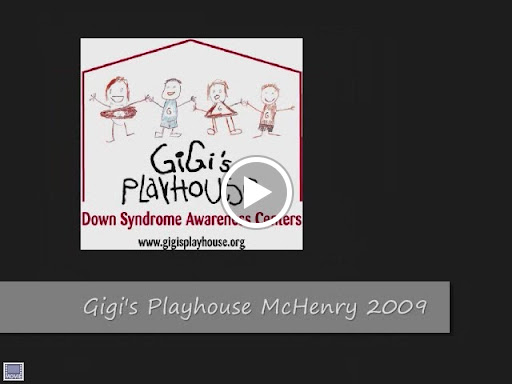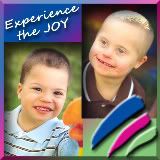Written by Jay Marshall, teacher and Flynn's dad. Flynn is a regular at GiGi's Playhouse McHenry and his mom graciously donates her time as the volunteer host of our Teen Tastic program. This article was reprinted from the Nov-Dec Pedaler. Original article can be viewed here.
Thirteen years and three months ago my life changed undoubtedly for the better. That is when my son, Flynn, was born. Of course any parent can say the same thing when their first child became a part of their life, but some parents in my and my wife’s situation, might not have looked on the event in the same way. I suppose it has to do with the way we were raised, and the life experiences we had. I think one way to sum up our outlook was that it came down to our attitude. What made the birth of Flynn different for us was that when Flynn was born we shortly found out that he was born with Down syndrome.
This is an annual letter I started writing about 8 years ago. I send it to my teacher colleagues in Antioch District 34, but also to friends and other acquaintances. I have heard that it has made the rounds to Down syndrome support groups and I guess I am glad about that. I always send it out on October 1st - at least to District 34 – because October is designated as Down syndrome awareness month by various organizations that support people with Down syndrome and their families. But let’s get back to Flynn.
Flynn is now thirteen and many people are remarking on how tall he is. He attends Johnsburg Junior High School, and Nippersink Middle School in Richmond. Johnsburg has an adjusted learning program called ALPS that he really loves attending. He spends most of his day at Johnsburg, but is bussed back to Nippersink to end his day with kids from our home community so that he gets good socialization with two groups of kids. When we go out in the community to home football games or the grocery store or if we are at a parade, I am amazed at all the kids that say hi to Flynn. Just last week a girl said hi at the Richmond Burton game and then she opened up her arms and asked him if he wanted a hug. What 13-year-old boy would turn down a hug from a cute 13-year-old girl? Flynn walked right into her arms! He is growing up and has more in common with most kids his age than we would have ever thought!
Flynn loves to watch TV and his time has now been limited. He loves to play video games, and his time for that has been limited too. He loves to look at books and he can do that as much as he wants. But he would still rather watch TV or as he will say DVD. He can be very resourceful. The limits on TV include some new parental controls that we installed this summer which did not thrill any of the boys. One Saturday morning a few weeks ago Beth could not find Flynn in the house. She found him out in our van that has a DVD player watching a movie in the garage! I thought that was just brilliant!
Flynn’s biggest delay is his speech. As one of our friends figured out this summer, a great way to describe Flynn’s speech is to say that his tongue does not work right. He talks, but for most people most of the time it is unintelligible. Beth and I and Will and Reed are pretty good at interpreting Flynn, but we still have times when we have to really figure out what he is saying. One interesting development I noticed this year is that Flynn is able to give us clues by describing what kind of word he is trying to say, and that we are trying to guess. If he says “nthee”, I might just have to say “What?” Then he will say “name” to tell me that he is saying a name. Then I can guess “Anthony” and he will say “yeah”. He will do this with movie titles bye giving the clue “D V D” too. I think it shows the cognition that is happening in his brain. He just has a hard time getting his thoughts out. He has other cognitive delays as well. His math function is very low. He is adding numbers proficiently using touch math. He does not write very much. But he is in a program that will merge into a program at our high school that will give him the daily living skills he will need to work towards independence. We are excited about the progress he is making and the successes he will continue to have. One neat device he has that he uses mainly at school, but that we need to start incorporating all the time is a speech box. It is a 4 inch by 12 inch computer with a touch screen that he uses to find things to say. I think it has well over 20,000 words. It is amazing, but it does take some time to learn how to use it. One function he has mastered is the phrase “She’s beautiful” which he does not hesitate to say when he goes to the high school each morning to catch the bus. Flynn walks up to the high school girls and presses the button and ‘says’ “she’s beautiful!”
One of the big things I always talk about in these letters is the use of the word retarded. Kids misuse this word at best, and insult each other and people like Flynn at worst. I tell kids retarded does not mean stupid. Retarded means slowed down or delayed. This is just something to be aware of during Down syndrome awareness month, and the rest of the months too.
This letter always goes longer than I think it will so thank you if you are still reading. One other thing I wanted to mention this year is the topic of babies being born with Down syndrome. I can’t remember the exact statistic, but between 25% and 40 % of children born with Down syndrome need heart surgery within days of being born. This is a very good reason to improve screening techniques for genetic disorders during pregnancy. Sometimes there are other reasons people screen, and without making this a big deal I am just going to say that I don’t think there are always good reasons to screen for genetic disorders during pregnancy.
People with Down syndrome have a great deal to teach us. I love that Flynn is 13 and still gives me a hug when I wake him up, a hug when I come home, and a hug when I say good night. I am going to borrow this next bit from a publication on the National Association for Down syndrome web site. It is titled, “If People with Down syndrome Ruled the World.” I think it says a lot.
These are just some excerpts:
- Affection, hugging and caring for others would make a big comeback.
- All people would be encouraged to develop and use their gifts for helping others.
- People would be refreshingly honest and genuine
- People engaged in self talk would be considered thoughtful and creative. Self talk rooms would be reserved in offices and libraries to encourage this practice.
- In the world of Down syndrome, there would be a great deal more tolerance for:
- Repeating the same phrase or question
- Use of the terms “fun” and “cleaning” in the same sentence
- Closing doors or cabinets that are left ajar (even in someone else’s house)
- Arranging things until they are “Just so.”
- Musicals would be very, very, very, big (such as “Grease,” and “The Sound of Music”)*2008 update* (“Hairspray” and “High School Musical”)
- John Travolta would be the biggest star.
- Classic TV hits would be very BIG and take up at least half the TV schedules.
- “I Love Lucy,” “Happy Days,” “The Three Stooges,” etc. would be very BIG.
- Wrestling would be very Big.
- “Life Goes On” would also be very Big and replayed regularly.
- There would be fewer movies, but they would be replayed over and over.
- Movie theaters would allow people to talk out loud to tell what happens next.
- People would not hurt the feelings of others and they would also not lie or keep secrets.
- Therefore there probably would be no secret service agents, spies, or terrorists.
I would say the world could use more people with Down syndrome. The amount of joy they bring into peoples lives is extraordinary. Thank you for reading.








